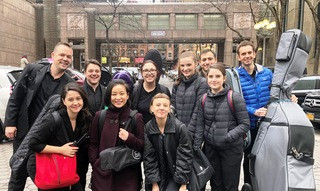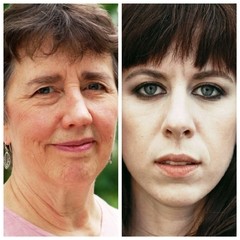|
Back
More Than a Day for International Women New York
St. Paul's German Evangelical Church
03/06/2020 - & March 7, 2020
Tim Kiah: Truth unto the People (World Premiere)
Mike Boyman: Concerto For Two Horns and Wind Ensemble (World Premiere)
Missy Mazzoli: River Rouge Transfiguration
Gabriela Lena Frank: Elegia Andina
Joan Tower: Made in America
Bonita Oliver, Onome (Voices)
Jessica Santiago, Emily Wong (Horns)
Chelsea Symphony, Mark Seto, Matthew Aubin (Co-Artistic Directors/Conductors)

M. Aubin, Chelsea Symphony (© Chelsea Symphony)
“Imagine what an unsightly matter to see a woman play upon a tabor or drum or blow in a flute or trumpet, or any like instrument. The boisterousness of them doth cover and take away that sweet mildness which setteth so forth every deed that a woman doth.”
Baldassare Castiglione, The Book of the Courtyer (1528)
“Loud music is too harsh for ladies’ heads;/Since they love men in arms as well as beds.”
William Shakespeare, from Pericles
Women have not had a good run as composers or performers. A millennia ago, the talented Hildegarde of Bingen was lost for a few centuries. (Again, in Shakespeare’s words, Chanting faint hymns to the cold fruitless moon.) Francesca Caccini and Barbara Strozzi were incredible Renaissance composers, but hardly known outside Italy.
Strozzi herself demands an opera or novel. Composer, singer, string player, she presided over the otherwise all-male Academy of the Unisons.
As for Clara Schumann and Fanny Mendelssohn...well, the legends of their pianism and composing would have been lost save for husband and brother. Chaminade and Beach are pretty great names, yet remain in the shadows of their male forebears.
The Boulanger sisters are the true exceptions, actually major figures in any history of music.
Now we come to this century, and 48 hours before International Women’s Day, the Chelsea Symphony–for 15 years pioneers in personnel and premieres–presented five works revolving around...well, international women.
Not all the music was composed by women. (That would be as laughable as a concert of music by all men.) But themes, artists and, yes, composers, were given splendid performers by the soloists and the Chelsea Symphony itself. The quintet of works varied in attractiveness, and I had my personal druthers.
Not the most challenging but by far the most emotionally appealing–where, within a few measures I was almost crying–was the opening work, Truth unto the People, a tribute to the first American Suffragette, Sojourner Truth. The orchestral music could have been written 80 years ago, by Roy Harris, even Copland’s Lincoln Portrait. The words were by Sojourner Truth herself. The two “voices” (as described in the program) neither sung nor spoke, nor chanted. They combined all three, their own voices in unison, in canon, in harmony, in a panoply of simple, modest yet fiercely affecting feelings. All too short, perhaps, but the right length.
The second was by one of my favorite composers, Gabriela Lena Frank, a woman who extols and gives honor to a singular heritage: Lithuanian Jewish father, Chinese/Peruvian/Spanish mother. A joy to both hemispheres. Her Elegia Andina (Andes Elegy) could have been written by Ginastera or Villa-Lobos or Chávez. Yet their European antecedents colored\ all that music.
Ms. Frank is a total original. We had no quotes, no folky melodies. We did have a sense of the forest loneliness. Beautiful flute duets (why doesn’t the Chelsea Symphony list their artists?), a finishing clarinet solo (ditto), and the large percussion group didn’t need punctuation or clashings. Theirs were the sounds–not imitative but simulations–of the huge palms and rubber trees which I felt in the Ecuador Amazon some years ago.
Previously Ms. Frank had written more “anthropological” music, based on simple prehistoric instruments. This was a lovely evocation of nature.

J. Tower/M. Mazzoli (© Courtesy of the Artists)
The best known composers were Missy Mazzoli and Joan Tower. Both are masters of their craft. Neither were shown at their best last night.
Ms. Tower’s Made in America was a subtle partly ironic tribute to Irving Berlin’s America the Beautiful. The first four notes...rarely six notes...popped out of an amorphous orchestral pattern. It is Ms. Tower’s most popular work, played by countless school orchestra.
Ms. Mazzoli is one of the great originals of American music, each work different from the others. Her homage to Detroit paired the industrial percussion, piano, harp and pizzicato strings against the orchestral “organ” of a great city. The picture was spasmodic, perhaps done better a century ago with Mosolov’s Iron Foundry.
Two terrific soloists–both members of the Chelsea Symphony–stood out in a Double Concerto for Two Horns and Wind Ensemble by Michael Boyman. (Which actually includes basses, harp and percussion.)
Jessica Santiago and Emily Wong would not have pleased the 16th Century misogynist quoted above–but their expertise, their sense of fun in a “Fanfare” and a “Hunt” which goes disastrously wrong (“No animals were hurt during this movement”), were terrific. The longer “Chorale” was a bit wearying, mainly because the originality and jocular tones and technical brilliance of this pair didn’t need anything even cusping on the lachrymose.
Harry Rolnick
|